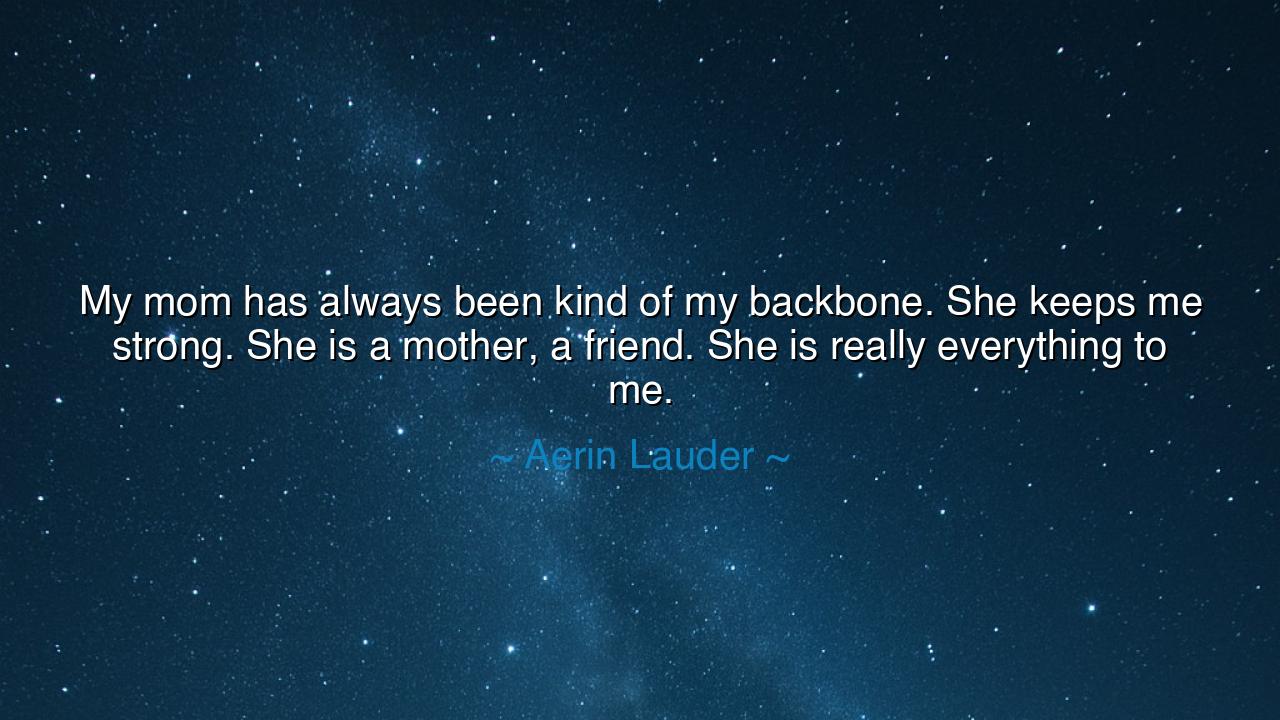
My mom has always been kind of my backbone. She keeps me strong.
My mom has always been kind of my backbone. She keeps me strong. She is a mother, a friend. She is really everything to me.






When Aerin Lauder said, “My mom has always been kind of my backbone. She keeps me strong. She is a mother, a friend. She is really everything to me,” she was not simply describing affection — she was invoking one of the oldest truths of human existence: that the mother is the pillar of strength upon which the child builds their life. These words carry the weight of gratitude and the echo of generations, for in every age, the bond between mother and child has been both the foundation of endurance and the cradle of wisdom. In Lauder’s voice, we hear both reverence and remembrance — the recognition that what endures in us often comes from the quiet power of those who raised us.
To call her mother her “backbone” is no mere figure of speech. In the language of the ancients, the spine was the symbol of steadfastness and vitality, the unseen strength that holds the body upright. So it is with the mother’s influence — unseen, perhaps, but always present, sustaining her children through trial and triumph alike. For Aerin Lauder, who carries the legacy of her grandmother Estée Lauder and the great house that bears their name, her mother’s strength is not just emotional but generational. It is the invisible structure of grace, discipline, and love that allows her to stand tall in the face of the world. In that sense, her words are both personal and universal — a hymn to the enduring inheritance of courage that flows through maternal love.
Throughout history, the strength of mothers has shaped not only families but entire civilizations. Consider the story of Cornelia, the mother of the Gracchi, in ancient Rome. When asked to display her jewels, she pointed to her sons and said, “These are my treasures.” Cornelia’s love was not soft or idle; it was instructive and fierce, forming the hearts of men who would challenge injustice in their time. Likewise, Aerin Lauder’s tribute to her mother reflects the same spirit — not of indulgence, but of formation. Her mother was not merely a comfort, but a guide and friend, shaping her daughter’s soul with both tenderness and expectation. True motherhood, as both Cornelia and Lauder suggest, is the art of strengthening through love.
Lauder’s words also speak of balance — that sacred union between nurture and friendship. To call her mother both “a mother” and “a friend” is to honor a relationship that transcends duty. It speaks of companionship rooted in respect, of shared laughter and mutual trust. In this bond lies the evolution of love across time: the parent who once guided the child becomes the friend who walks beside her. The ancients would call this transformation the cycle of the hearth — the point at which warmth becomes light, and guidance becomes companionship. It is a reminder that love, when cultivated with care, ripens into friendship that neither time nor distance can undo.
There is humility, too, in Lauder’s declaration that her mother is “everything to me.” For in a world that often glorifies independence, such words affirm the power of connection. They remind us that no one stands alone. The greatest among us are not self-made; they are shaped by love, molded by example, and sustained by the quiet strength of others. To acknowledge one’s dependence on such love is not weakness, but wisdom — the wisdom of gratitude, which sees that the heart’s true wealth lies not in possessions or accomplishments, but in relationships that endure beyond fame or fortune.
In every culture, the image of the mother as strength reappears like a sacred motif. In Greek myth, it is Gaia, the Earth Mother, whose steadfastness gives birth to all life. In the Hebrew tradition, it is Hannah, whose faith and resilience give rise to a prophet. In the modern world, it is women like Aerin’s mother, whose steadfast devotion sustains both family and legacy. Each, in her own way, embodies the eternal truth that love — not power, not wealth — is the true source of strength. The mother, in her constancy, becomes the living backbone of creation itself.
So, dear listener, take from Aerin Lauder’s words a lesson of remembrance and reverence. Honor those who have been your backbone — not only your mothers, but all who have supported you with quiet strength and unwavering belief. Tell them, while they live, that they are your foundation. And if you are a parent or mentor yourself, remember that your love may become the spine upon which another life is built. Teach not only with words, but with patience; strengthen not only with correction, but with care. For as Aerin reminds us, the greatest gift one soul can give another is enduring strength born of love — a backbone made not of bone, but of grace.
Thus, let these words be passed down: Be the backbone for those who falter, and honor the backbones who raised you. In this exchange of strength and gratitude, humanity renews itself, generation after generation. And though time may carry us far from our mothers’ arms, their spirit remains within us — invisible, steadfast, eternal.






AAdministratorAdministrator
Welcome, honored guests. Please leave a comment, we will respond soon